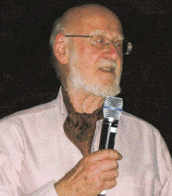After Foulkes retired from Maudsley he initiated the International Correspondence. He invited all who were interested in Group Analysis to send their letters to him.
S. H. Foulkes and development of a network face to face, in writing and virtually.
Malcolm Pines.
Founder member IGA London. Past president IAGP and GAS London,
Former consultant Psychotherapist Tavistock Clinic , Maudsley, St. Georges hospital, Cassel hospital.
Editor Group Analysis
After Foulkes retired from Maudsley he initiated the International Correspondence1. He invited all who were interested in Group Analysis to send their letters to him.
He was the post box and the postmaster, responding to each letter and encouraging writers to exchange with each other. In this simple and brilliant way he created a word -wide network before www emails!
Clearly Foulkes was living out his schema of the mind as a militiaperson creation, the brain as the substance that makes mind possible. At Northfield Pat de Mare says that at the last stage Foulkes was the embodiment of the group mind by the way he connected the parts and saw the hospital as a whole.
The International Correspondence gave birth to the Journal Group Analysis as the network grew more numerous and as formal training began and the discipline of Group Analysis claimed clinical and academic status. This change inevitably brought loss with the gain as the letter network ceased. Workshops and conferences give those who go to them the opportunity to meet and exchange and the conference large groups create a primitive network.
Context, the journal of GAS goes some way to restore a correspondence network.
As editor of Group Analysis for the past 16 years I have encouraged subscribers to respond in print to articles and have commissioned many “ Special Issues”, giving a fairly free hand to guest editors to choose their contributors, thus facilitating new networks to develop.
Malcolm Pines
1 NOTA de Juan Campos
G. A. I. P. A. C. , short for Group Analysis International Panel and Correspondence, was launched and edited in 1967 by S. H. Foulkes, the founder of the Group-Analytic Society (London). At his retirement in 1975, when he handed the editorship over to Pat de Marè registered subscribers of G. A. I. P. A. C. were quite a large group, around five-hundred. To grow and to perish was its destiny. Six years after Foulkes death in 1976 G. A. I. P. A. C. also perished during the Bedford College May meeting in 1982, run over by the European Group-Analytic Movement fostered by it. But, the spirit of G. A. I. P. A. C. is still alive among the files of the Group-Analytic Society. This is the third time that the owner of this e-group attempts the Operation Phoenix G. A. I. P. A. C. The first time was in 1989, when the Study Group in Group Analysis was approved as a Special Interest Section of the IAGP during its Amsterdam World Congress. The second time was during the European Group-Analytic Symposium in Heidelberg in 1993. And this, the third one, was initiated as a Forum "On Internationality" es. groups. yahoo. com/group/groupanalysis/?yguid=613. . . in the GAS Web in 2002 and published in CONTEXTS, N 22 of February 2003. It is to foster a more free and open discussion On Internationality among members and sympathizers of Group Analysis that we offer this forum here again ---Most likely the last attempt at “Operation Phoenix GAIPAC”!
IMPORTANTE: Algunos textos de esta ficha pueden haber sido generados partir de PDf original, puede sufrir variaciones de maquetación/interlineado, y omitir imágenes/tablas.

Acercándome a S. H. Foulkes.
Jesús M. de Miguel
Fecha Publicación: 01/03/2006
Presentación de las Obras Completas de S. H. Foulkes. El grupoanálisis: Pasado, presente y futuro.
Hari Camús
Fecha Publicación: 01/03/2006